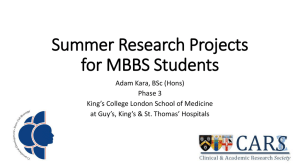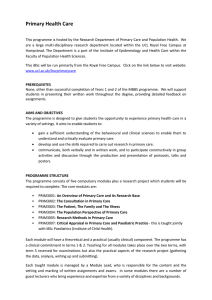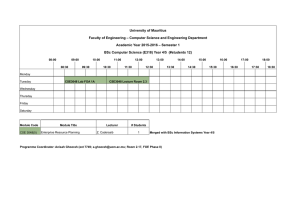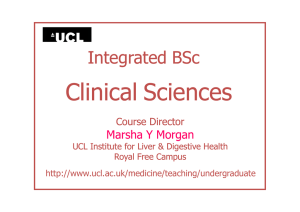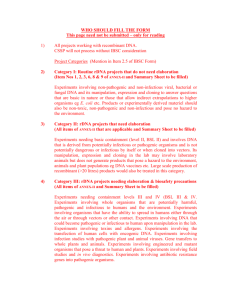– Intercalated BScs why do we offer them and what do they achieve?
advertisement
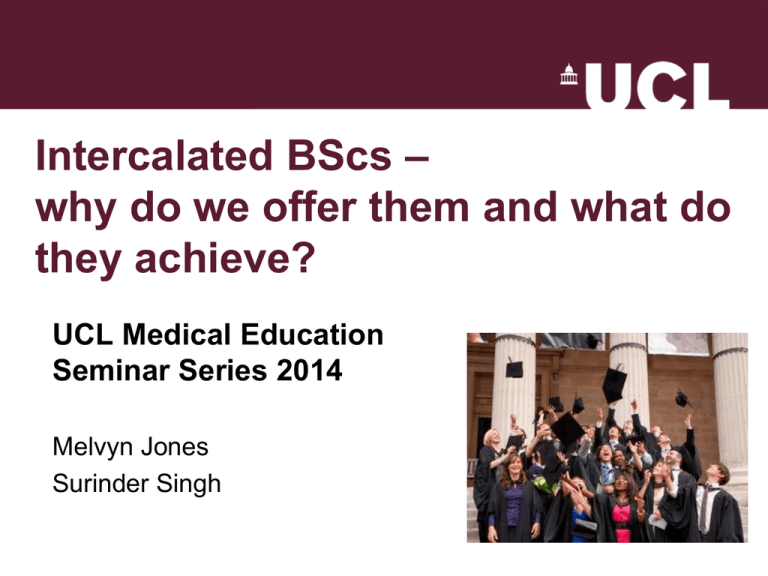
Intercalated BScs – why do we offer them and what do they achieve? UCL Medical Education Seminar Series 2014 Melvyn Jones Surinder Singh BEME: Systematic review of role of intercalated BScs in medical education Dr Melvyn Jones Dr Surinder Singh Dr Patrick Hutt Dr Sophie Eastwood UCL Research Department of Primary Care & Population Health, BEME Collaboration The Best Evidence Medical Education (BEME) Collaboration is an international group of individuals, universities and professional organisations committed to the development of evidence informed education in the medical and health professions Publishes online and in Medical Teacher A little interaction: How many of you did an intercalated BSc? If you did or didn’t do a BSc? • Why did you do it? • What did you get out of it? • Do you / did you use it in your career? • Did it help you with your career choice? • Why didn’t you do one? – Was it a choice? – Was it relevant to you at the time? • Do you regret not doing one? If so why? – Has the absence of an iBSc impacted on your career? Why do you think we offer iBScs? • What do you think the role of an intercalated BSc is in training potential doctors? – – – – Improve / widen skills for future clinicians? Make new clinical academics? Get more time in the curriculum for my subject? Free labour for the lab? Aim To review systematically published literature on the outcomes of students undertaking a BSc with the following outcomes: – performance in UG or final exams, – impact on career choice – and impact on professional skills and values. Background: • Intercalated or integrated BSc (iBSc) courses are usually voluntary extensions to undergraduate medicine courses • UK, and the Commonwealth countries – (Australia, NZ, SA, Caribbean, Canada, Ireland) • Historically offered in basic sciences • Usually offered to most able students • Traditionally associated with progression into academic and hospital careers • Increasingly availability of clinical and primary care iBScs • Costly to students and other stakeholders • Impact on GP and specialty recruitment is unknown. Methods: • • • • Systematic review (BEME review) Quantitative and qualitative data standard methods searching: Odds ratios derived where possible – (BSc/ non BSc) • If no comparator data, standard UK career data used (Lambert) • For both methodologies abstracts were independently reviewed • CIS data was analysed using standard qualitative methods Searches • Standard SR searches – ERIC, Medline/National Library of Medicine (NLM), PsychINFO, EMBASE, the student BMJ database • Search terms – medical student AND (outcome OR progres$ OR exam OR succes$ OR fail$) , bsc OR bachelor OR degree OR intercalated [Text Word] OR honours [TW] OR honors [TW] OR complementary • Search results – Quant 19 studies (meeting quality criteria applied) – CIS 46 from 485 identified sources Critical Interpretive Synthesis (CIS) Key processes: • A review question – from the start but subject to modification • Searching/sampling/critique & analysis proceed simultaneously • Analysis ->aimed towards development of a synthesising argument • Constant need for reflexivity to inform the emerging theoretical notions (as these guide other processes) • CIS encourages an on-going orientation to the material to be included in the review.. • It does not offer pre-specified procedures for the conduct of the review; the ‘authorial voice’ is acknowledged; it may not be strictly reproducible but its aim is to offer “a theoretically sound and useful account that is demonstrably grounded in evidence” • CIS demands constant reflexivity on the part of author of reviews. Critical Interpretive Synthesis (CIS) Sources– research papers, letters, opinion pieces and other articles including ‘grey literature’ Date range 1.1.1984 - 1.11.2012 The data was analysed by 2 researchers – – Dr Patrick Hutt & Dr Sophie Eastwood (updated 2013) – used a thematic framework (Ritchie and Spencer 1994) Results - format • Search results – Quantitative 19 studies (meeting quality criteria applied) – CIS 46 from 485 identified sources – Integrating data….. (Integrationist approach Adamson 2005) • Present data along a chronological student path • Data coming from both methodologies – – – – – – students’ decisions about undertaking an iBSc ; students’ performance in undergraduate or final exams; impact on students’ professional skills and values ; students’ experiences of doing an iBSc ; effect on students’ career choices ; the ramifications (financial, personal) for students of doing an iBSc. Results - format • Search results – Quantitative 19 studies (meeting quality criteria applied) – CIS 46 from 485 identified sources – Integrating data….. (Integrationist approach Adamson 2005) • Present data along a chronological student path • Data coming from both methodologies – – – – – – students’ decisions about undertaking an iBSc (CIS); students’ performance in undergraduate or final exams (quant); impact on students’ professional skills and values (CIS and quant); students’ experiences of doing an iBSc (CIS); effect on students’ career choices (CIS and quant); the ramifications (financial, personal) for students of doing an iBSc (CIS). Students’ decisions about undertaking an iBSc • evidence that iBScs were pursued by students interested in research/academic medicine • the expectation that the iBSc would help their career • Though importantly - not all careers “for those intending to pursue a clinical career in… psychiatry, general practice – you should consider whether your desire for intellectual stimulation outweighs the time and money constraints” (Leung 2001) Students’ performance in undergraduate or final exams (quant); Impact of the iBSc degree on undergraduate medical student performance Mahesan reports “internally intercalating students had a year 5 mean result that was on average coefficient of 1.27 points (95% CI 0.52 to 2.02) greater than non intercalating students” Students’ performance in undergraduate or final exams (cont’d) • two studies out of five reported an improvement in UG performance associated with undertaking an iBSc. – Howman UCL 2010 no selection bias- no effect – Mahesan King’s 2011 (high qual study) small positive effect • yr 5 mean coefficient of 1.27 points (0.52 - 2.02) greater – Cleland 2009 Aberdeen (high qual study) no effect – Wyllie 1986 strong +ve effect – Tait 1995 mixed effect Improved skills • Research skills (almost universal) – Lab skills (white 2006). • independent intellectual thought and stimulation (Williamson JD 1986) (Elwood 1986). • Deeper learning skills (McManus) (Quant) • Worsening ethical skills (Goldie 2004) (Quant) • improvement to critical appraisal skills (Attwell and Boyd 1996;Iqbal K 2001;Jones M, Singh S, & Lloyd M 2005) (Weidmann A 2002) • personal study skills, (self-discipline, time management (Elwood, Pearson, Madeley, Logan, Beaver, Gillies, Little, & Langham 1986;Price H 1998). • interpersonal skills – Empathy (Moscrop A 2002) – improved communication skills with clinical iBScs “the ability to talk to patients” Students’ experiences of doing an iBSc (CIS) • enjoyable and some felt it had had a profound effect on their lives “ That was the year that I learnt to think and to question and to find out things for myself. That is where the (iBSc) degrees may be so important they prepare students for a lifetime of learning” (BMJ editor Richard Smith 1986) • time out from MB BS course Negatives • Money-course fees, loss of income/ salary, more debt – With mounting student debt & moves by the UK government to almost triple tuition fees…accumulating another year’s debt whilst also delaying payment of your growing negative balance can be a serious turn-off” (Rushforth 2004) • Loss of students’ social network • Academic stress – “pressure to publish” – concerns about being exploited in laboratory settings Effect on students’ career choices (CIS & quant); • perceived benefit to general employment opportunities • Discipline-specific • Mechanisms – Useful contacts – Impact in job interviews – More likely to get funding and to do higher degree/ fellowship applications – Specific extra credits ie UK Foundation programme Impact on careers (CIS) Questioning whether relevant or necessary for a career in GP • “..what’s the point?’ because a BSc is to help you become a consultant” (Med Teacher 2003 student) • Integral value of BSc beyond tactical career move – “It isn’t just consultants that need a BSc” Impact of BSc on specific careers – Wyllie (Pathology) – Williamson (infection and immunity) – MacGowan (Medical biology) – Nguyen (public health and epidemiology) Wyllie Williamson Studies • Not in review • Strong positive effect on discipline specific careers MacGowan Nguyen 0 Log OR 10 20 favours BSc-> Results GP career (quantitative analysis) • Eight studies that report impact on students' pursuing GP careers. • Students with an iBSc show a lower likelihood of pursuing careers in GP - OR for a GP career ranged from 0.99 (OR 95% CI cross unity) to 0.17 (0.07-0.36). • Additionally one author stated iBSc students “showed …less interest in general practice”. career intention of 2.27 for iBSc students vs 2.46 p<0.001 (range of 1-5 where 5 indicates a definite intention to pursue GP career) Nguyen Impact of iBSc degrees on subsequent careers in general practice Lambert Gerrard MacGowan Wyllie Williamson Eaton Young 0.01 1 Log Odds Ratio <-- favours non GP career However… • If we look at GP relevant courses • (caveat Fukura’s study was on undergraduate career intentions) Academic careers • 4 studies -students with an iBSc have improved prospects of academic progression • ORs 3.64 (95% CI 2.32-5.77) to 5.94 (95% CI 3.60-11.54). • McManus reported a career preference to pursue “medical research” in finals students 2.18 (sd 1.10) for iBSc students vs 1.71 (sd 0.88), p<0.001 • Nguyen “55% reported that the (honours) year had increased their likelihood of choosing an academic career”, 19% “felt reduced the chances.” Summary of BEME review • Mixed results on UG exam performance – But developing other useful skills • Increased chance of pursuing academic career – Reduced chance of following GP career • Important but less quantifiable benefits- curiosity, space to think, time-out) • Costs (time and money) and separation from peers are the key negatives (not ucl) Strengths and weaknesses of this study • Mixed methods • Novel approach (CIS/ integrationist) • Explores the data on a number of key issues for stakeholders • Student and faculty voices captured • Some of the studies are methodologically weak • Selection bias - good students do iBScs… • Publication bias (just because I say my course is ‘good’ doesn’t mean it is…..) Summary of seminar • Questions to the audience – Should iBScs be compulsory (eg UCL, Imperial, Oxbridge Nottingham)? – If they are optional how do we keep them equitable? – Should iBSc have to have clinical relevance? – Are they good value? (students/ faculty) – What should the generic objectives of an IBSc be? – Rebrand as intercalated higher degrees? iBScs at UCL – a dynamic field? In the past few years: Integrated BSc (not intercalated) External students not allowed in at UCL – this may change depending on a sensible business case iBScs at UCL – a dynamic field? New intercalated BSc in Population Health ?different pathways in paediatrics/global health/?women’s health New 3 year BSc being developed (for example BSc in Population Health for 2015/16) Health demography Health psychology Quantitative medical sociology Health economics Reflection on the review process • Very long and time consuming • Can biomedical review rigour work in educational research? • BEME is unfunded so reviewers take a long time • Mixed methods are problematic for reviewers • Double jeopardy (5 reviewers) • UCL BICC proposal
